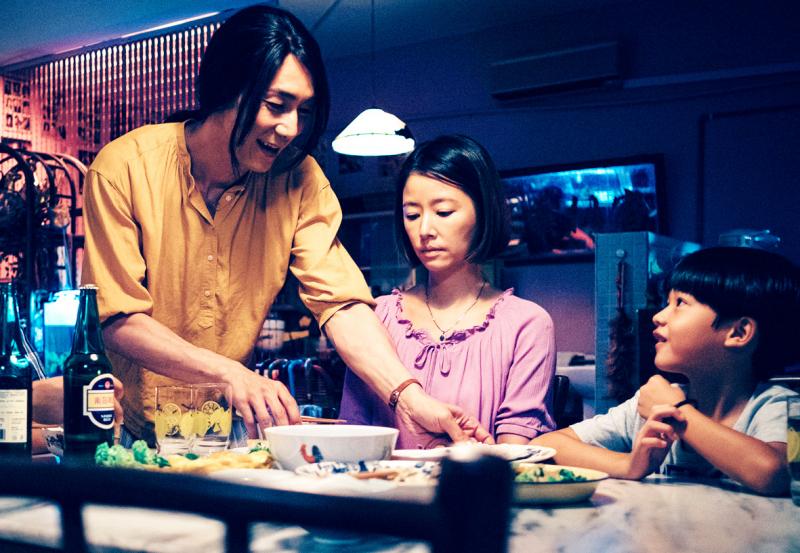Treated with violence and relentless mockery, and shunned to the point that even her grown children don’t want anything to do with her, 55-year-old transgender woman Evon (Lee Lee-zen, 李李仁) has paid a huge price just to be her self. As if things couldn’t get any worse, she loses her job and her only friend is murdered when walking the streets. And that’s just the beginning.
The events that happen to Evon may seem a bit too exaggerated to create despair and emotion, but it also starkly highlights the challenges transgender people face in Malaysia, where the film is set. There, they long suffer from widespread brutality, injustice and discrimination, while religious authorities continue to arrest and punish people just for their sexuality.
While not nearly as bad, don’t think that there isn’t a problem in Taiwan. It isn’t exactly rosy for the transgender community here either despite the nation’s advancement in LGBTQ rights.

Photo courtesy of MM2 Entertainment
Lee, who lost 13kg for the role, portrays Evon with finesse and subdued emotion — she rarely reacts even in the most heartbreaking and humiliating situations (including her daughter screaming at her in public for daring to attend her wedding), but Lee is able to exude the sheer disappointment and sorrow through the cracks of Evon’s stoic exterior. And when Evon does break down, all that’s repressed gushes out in a lifetime of pain.
Lee invokes just the right amount of femininity for this setting and does a convincing job, while the over-the-top diva role is claimed by her roommate and friend, Lucy. The dynamic between the two is fun but brief.
An extremely gentle and sentimental soul, Evon desires intimacy and family. She was a caring family man who waited for her wife to die before transitioning and for the previous 10 years has used her wife, son and daughter’s birth dates to buy lottery tickets. She eventually finds a semblance of what she desires when she takes in illegal Vietnamese migrant Sophia (Ruby Lin, 林心如) and her young son, and befriends Teck (Jack Tan, 陳澤耀), his hearing impaired coworker-slash-love interest who dreams of becoming rich.
This rag-tag group, each with their troubles, do enjoy some tender, tear-jerking moments. In any event, we become so emotionally invested in Evon’s character that we genuinely hope that everything turns out for her.
Lin, who makes her producing debut, does an adequate job portraying the quiet, reserved mother who will do anything to survive and protect her child, but her barely passable Vietnamese accent makes the dialogue rather unnatural. Teck’s cheerful but desperate character is also complex, and the cinematography helps with capturing the expressions and emotions that belie their outward behavior.
There are some overly melodramatic and sappy moments and a few questionable plot devices, but overall the film allows Malaysian director Teddy Chin (陳立謙) to tackle a number of important topics through Taiwan’s liberal cinema scene. But ultimately it is Lee’s sublime performance that makes Miss Andy truly worth watching.

William Liu (劉家君) moved to Kaohsiung from Nantou to live with his boyfriend Reg Hong (洪嘉佑). “In Nantou, people do not support gay rights at all and never even talk about it. Living here made me optimistic and made me realize how much I can express myself,” Liu tells the Taipei Times. Hong and his friend Cony Hsieh (謝昀希) are both active in several LGBT groups and organizations in Kaohsiung. They were among the people behind the city’s 16th Pride event in November last year, which gathered over 35,000 people. Along with others, they clearly see Kaohsiung as the nexus of LGBT rights.

Dissident artist Ai Weiwei’s (艾未未) famous return to the People’s Republic of China (PRC) has been overshadowed by the astonishing news of the latest arrests of senior military figures for “corruption,” but it is an interesting piece of news in its own right, though more for what Ai does not understand than for what he does. Ai simply lacks the reflective understanding that the loneliness and isolation he imagines are “European” are simply the joys of life as an expat. That goes both ways: “I love Taiwan!” say many still wet-behind-the-ears expats here, not realizing what they love is being an

In the American west, “it is said, water flows upwards towards money,” wrote Marc Reisner in one of the most compelling books on public policy ever written, Cadillac Desert. As Americans failed to overcome the West’s water scarcity with hard work and private capital, the Federal government came to the rescue. As Reisner describes: “the American West quietly became the first and most durable example of the modern welfare state.” In Taiwan, the money toward which water flows upwards is the high tech industry, particularly the chip powerhouse Taiwan Semiconductor Manufacturing Co (TSMC, 台積電). Typically articles on TSMC’s water demand

Every now and then, even hardcore hikers like to sleep in, leave the heavy gear at home and just enjoy a relaxed half-day stroll in the mountains: no cold, no steep uphills, no pressure to walk a certain distance in a day. In the winter, the mild climate and lower elevations of the forests in Taiwan’s far south offer a number of easy escapes like this. A prime example is the river above Mudan Reservoir (牡丹水庫): with shallow water, gentle current, abundant wildlife and a complete lack of tourists, this walk is accessible to nearly everyone but still feels quite remote.